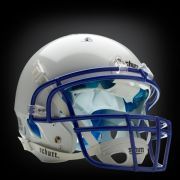This Advanced Ultrasound Headset Can Recognize Concussions in Athletes
Physicians can now more accurately recognize concussions in athletes by using an advanced form of ultrasound.

Physicians can now more accurately recognize concussions in athletes by using an advanced form of ultrasound.
The technique specifically works by mapping blood flow in athletes’ brains, reported a new study that will be presented at the American Academy of Neurology’s 68th Annual Meeting in Vancouver, Canada.
“There is growing evidence that concussions can change the blood flow in the brain. While such changes may be detected with MRI, we believe there may be a less expensive and portable way to measure these changes with a Transcranial Doppler (TCD) device,” said Robert Hamilton, PhD, co-founder of Neural Analytics in Los Angeles, CA.
Researchers used an advanced version of TCD ultrasound to attain a complete picture of blood movement through the middle cerebral artery in a study involving a total of 235 athletes.
The athletes including 66 high school students in contact sports who were recently diagnosed with a concussion and a control group of 169 high school athletes — all spanning sports like football, soccer, basketball, hockey, water polo, lacrosse, cheerleading, cross country, cycling, tennis, and track.
The concussed athletes had their brain flow measured with the advanced ultrasound headset in an average six-day period after the injury.
According to the study results, compared to the traditional TCD ultrasound measurements, the advanced version successfully distinguished between healthy and concussed athletes 83% of the time.
Hamilton concluded, “This research suggests that this advanced form of ultrasound may provide a more accurate diagnosis of concussion. While more research is needed, the hope is such a tool could one day be used on the sidelines to help determine more quickly whether an athlete needs further testing.”